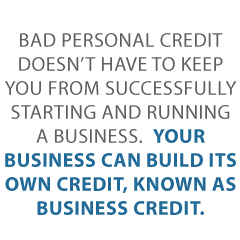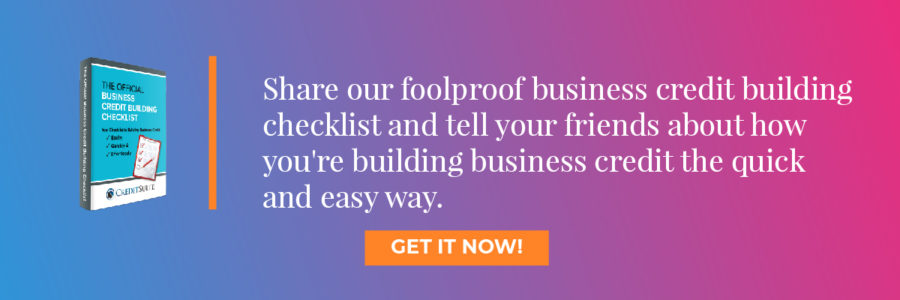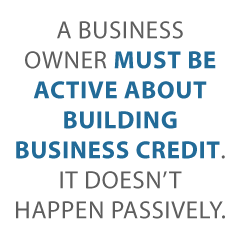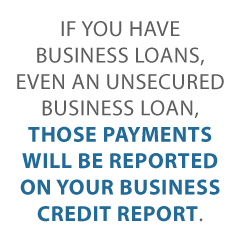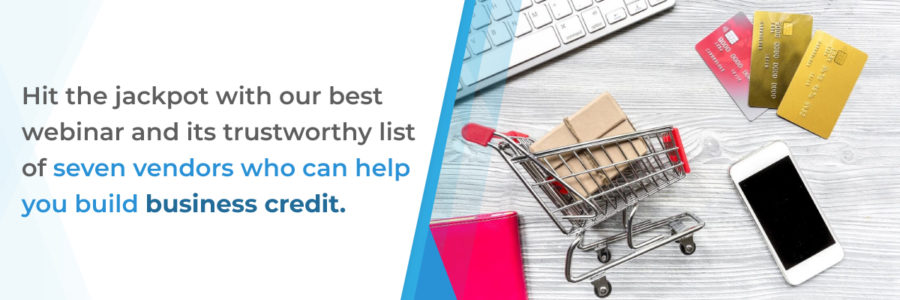
Haunted by Bad Personal Credit? You Can Get Business Credit with Bad Personal Credit
Bad personal credit doesn’t have to keep you from successfully starting and running a business. Your business can build its own credit, known as business credit. You can get business credit with bad personal credit. There is a very specific process you have to follow however. It isn’t hard, but it doesn’t happen on its own, either. You have to be intentional. We’ll show you how.
4 Rules for Surviving Business Credit with Bad Personal Credit: Don’t Let Bad Personal Credit Scare You Out of Business
You know that feeling you get when you are watching a spooky movie? Even if everyone on the screen looks happy, you know that something bad is lurking just around the corner. Trying to run a business with bad personal credit can feel the same way. Even if things are going well, you know that eventually you may need to borrow money. You also know that your bad personal credit score is going to choose that exact moment to jump out at you. Just like that, the good times could be over.
It doesn’t have to be a blood bath though. There can be a happy ending. We are going to show you how to survive to the end, just like those characters that are still alive at the end of the movie. It’s called business credit, and you can build business credit even with bad personal credit. Your past personal financial issues can’t stop you. Whatever point you are at in your business, now is the time to get started. The enemy is lurking. It’s time to start fighting back.
Check out our best webinar with its trustworthy list of seven vendors to help you build business credit.
Light the Fire to Forge Business Credit with Bad Personal Credit
The first that happens in any movie when a weapon is being forged is they light a fire. Here is how you light the fire of business credit. You have to make your business appear to lenders as a fundable entity separate from yourself. You want them to see your business on its own merits, separate from your personal credit history.
Separating your business from yourself if the first essential step in building business credit with bad personal credit. It is easiest to do this when you set up your business initially, but it is never too late. If you are already operating, do it now. Here’s how you start.
The Rules of Surviving Business Credit with Bad Personal Credit
According to the popular 90s movie “Scream,” there are rules for surviving to the end of a scary movie. For example, don’t drink or do drugs, and never say “I’ll be right back.” Those people are the first to die. When it comes to separating your business from yourself for building business credit, even with bad personal credit, there are rules as well.
First Rule of Getting Business Credit with Bad Personal Credit: You Have to Incorporate
Formal incorporation is non-negotiable. If you operate as a sole proprietorship or a partnership, your personal credit will always find you. It is not possible to have the separation you need to get business credit with bad personal credit without incorporating. Not only that, but it will also help with liability protection.
What is negotiable, however, is the form of incorporation you choose. They all offer differing levels of protection, and the costs associated with each option varies. For the purposes of building business credit, they all work the same. Choose the option that works best for your needs and budget. Here’s a little about each one.
Corporation
This is the most expensive option, but it also offers the most protection from liability. There is a double taxation caveat with this option that is a turn off for most. Owners pay tax at both the business level and the shareholder level. In some cases, this is the best option anyway.
S-Corp
S-Corps are very similar to corporations, but double taxation isn’t an issue. There are also limits on the number of shareholders allowed among other restrictions set forth by the IRS.
LLC
An LLC, or a limited liability corporation, is the least expensive option. It still offers some liability protection, and has fewer restrictions than an S-corp.
Each of these options serves the purpose of further separating the business from the owner when you are looking to start a business credit profile. The option you choose should be the one that best suits your needs for tax purposes.
The Second Rule of Getting Business Credit with Bad Personal Credit: You Must Have Separate Contact Information
Do not let your business share an address or a phone number with you. Your personal address and telephone number are like a neon sign pointing to your personal credit. That is exactly what you do not want.
Even if you run your business out of your own home, it needs its own address. You can accomplish this by using a virtual office address. Virtual offices operate almost exclusively online. They offer a physical mailing address and at times, a host of other services such as receptionist options, meeting rooms, and video conferencing.
You also need a dedicated business phone number. You can either get a business landline, or there are a number of VoIP options available. Some will even forward calls to your existing landline or cell phone so you do not even have to get a new phone.
Make sure your business information is listed in the business 411 directory. You can do that here.
The Third Rule of Getting Business Credit with Bad Personal Credit: Get a Business Bank Account
This accomplishes a number of things. First, it shows lenders that your business is serious enough to have its own account. Also, many vendors and lenders require a business bank account with a minimum balance before they will approve credit. Lastly, a separate bank account for your business makes it much easier to keep business expenses separate from personal ones for tax purposes.
The Fourth Rule of Getting Business Credit with Bad Personal Credit: Website and Email Address
There is so much to this. First, you have to have both a website and an email address that are dedicated to your business. If you don’t have an online presence in today’s world, do you even exist? It’s a question to consider. Don’t let this be a question about your business. A strong online presence is important.
Your website needs to be user friendly and professional. If you aren’t someone who does this for a living, it is probably a really good idea to pay someone to design and launch your site. Pay for hosting with someone like GoDaddy. Do not use a free hosting service. Make sure you get a business email address with the same URL as your website. A free email service like Yahoo or Gmail will not work well.
Check out our best webinar with its trustworthy list of seven vendors to help you build business credit.
It’s Not Over ‘Till It’s Over: Build Business Credit with Bad Personal Credit
You know that moment when you think the movie is over and everything is going to be okay, and then the bad guy jumps into the frame and scares you to death. That’s where you are at this point. You can’t walk away and think everything is okay. Make sure it is really over.
Separating your business from yourself isn’t the whole game. This is just how you protect your business. Once you have it separated, you can rest knowing that your business credit will reap the benefits of all your hard work and grow big and strong. Your personal credit shouldn’t come into the picture much at all.
However, you still have to do the work to get business credit with bad personal credit. Even though it’s best to not run up the stairs in a scary movie, you have to climb a different type of staircase to get business credit. We like to call these tiers instead of stairs. Credit tiers, if you will.
Once you have your business set up as a separate, fundable entity, you can get accounts reporting to your business credit report. You have to do this without any credit though, because you do not yet have business credit, and your personal credit is bad. How does that work?
The Hero that Will Rescue You: The Vendor Credit Tier
The vendor credit tier is how you are going to begin to build business credit without your personal credit coming into play. This tier is made of starter vendors that will offer net terms on invoices without a credit check. They will look at things like length of time in business, annual income, and the balance in your business bank account instead.
They will also report these payments to the business credit reporting agencies. Once this happens, your business credit report will be open. Your score will begin to grow. It takes 10 or more of these types of accounts reporting before your score will be strong enough for the next credit tier.
The Other Credit Tiers: The Next Steps
After you have an initial credit score from using the vendor credit tier, you can move on to apply for cards in the other tiers. You have to do it in order. First is the retail credit tier. These are cards that you can only use in the stores that issue them. For example, a Best Buy card can only be used at Best Buy. An Office Depot card can only be used at Office Depot.
Once you have several of these reporting positive payment history, your score should be strong enough to apply for cards in the fleet credit tier. These are cards from companies like WEX and Fuelman that you can only use for fuel or auto repair and maintenance.
After you get enough accounts reporting from the fleet credit tier, it will be time for the top tier. This is the cash credit tier. Here you find cards that are not limited by location or type of purchase. You can use them wherever and for whatever. They typically have better rates, higher limits, and sometimes pretty great rewards.
Check out our best webinar with its trustworthy list of seven vendors to help you build business credit.
Keep an Eye on the Bad Guy
After you do the hard work of getting business credit with bad personal credit, you’ll want to keep your eyes open. You never know when personal credit or some other bad guy may try to creep in and spoil the happy ending. This is one time when you for sure do not want a sequel. This is where credit monitoring comes in.
Unlike your personal credit score, you can’t really get a free copy of your business credit report. You can pay for copies however, and this isn’t a bad idea to do once a year. You want to make sure there are no mistakes, all information is up to date and only business accounts are being reported.
We can help you monitor your business credit for a fraction of what you would pay the credit reporting agencies. Go here to get started.
Survive to the End: It is Possible to have Strong Business Credit with Bad Personal Credit
Don’t let bad personal credit haunt your business. You don’t have to be afraid if you follow the rules, just like in a scary movie. To separate your business credit from your personal credit, you must:
- Incorporate
- Have separate contact information for your business
- Get a dedicated business bank account
- Have a professional website and email address with the same URL as the website
If you do these things, the chances that your personal credit will find your business credit and cause trouble is greatly reduced. Your business can continue to thrive amidst any personal carnage. Remember however, you must follow the rules. Business credit doesn’t build passively like personal credit does. You have to be intentional and build it on purpose, with purpose. Climb the credit tiers, and once you make it to the top, your business will be able to survive whatever comes its way.
The post Haunted by Bad Personal Credit? You Can Get Business Credit with Bad Personal Credit appeared first on Credit Suite.

